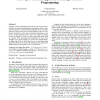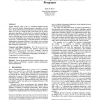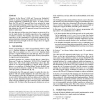ICFP
2006
ACM
15 years 8 months ago
2006
ACM
109
click to vote
ICFP
2006
ACM
16 years 2 months ago
2006
ACM
The development of design patterns in object-oriented programming aims at capturing good software design in a re-usable generic form. However, design patterns are not expressible ...
126
click to vote
ICFP
2006
ACM
16 years 2 months ago
2006
ACM
Datatype-generic programming (DGP) is the next step beyond abstracting over types using parametric polymorphism, which is often called "genericity" in object-oriented la...
107
click to vote
ICFP
2006
ACM
16 years 2 months ago
2006
ACM
Generic libraries, such as the C++ Standard Template Library (STL), provide flexible, high-performance algorithms and data types, along with functional specifications and performa...
104
click to vote
ICFP
2006
ACM
16 years 2 months ago
2006
ACM
Design patterns are reusable abstractions in object-oriented software. However, using current mainstream programming languages, these elements can only be expressed extra-linguist...
115
click to vote
ICFP
2006
ACM
16 years 2 months ago
2006
ACM
Generic Haskell is a language extension of Haskell for polytypic programming. Constrained types are parametric algebraic types with at least one argument constrained by type-class...
110
click to vote
ICFP
2006
ACM
16 years 2 months ago
2006
ACM
"Generics for the Masses" (GM) and "Scrap your Boilerplate" (SYB) are generic programming approaches based on some ingenious applications of Haskell type class...
125
click to vote
ICFP
2006
ACM
16 years 2 months ago
2006
ACM
Type-directed programming is an important idiom for software design. In type-directed programming the behavior of programs is guided by the type structure of data. It makes it pos...
103
click to vote
ICFP
2006
ACM
16 years 2 months ago
2006
ACM
Software libraries rely increasingly on iterators to provide generic traversal of data structures. These iterators can be represented either as objects that maintain state or as p...



